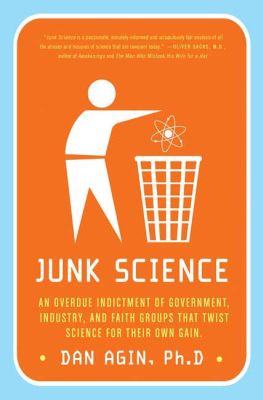

| JUNK SCIENCE An Overdue Indictment of Government, Industry and Faith Groups That Twist Science for Their Own Gain Dan Agin, Ph.D. New York: St. Martin Griffin, 2006 |
Rating: 5.0 High |
|||
| ISBN-13 978-0-312-37480-8 | ||||
| ISBN 0-312-37480-1 | 323pp. | SC | $14.95 | |
The subtitle calls this book an indictment, and that is exactly right: Dr. Agin condemns the corruption of science and reason whenever it appears, and not only in current events. This is no rant against the Bush administration, though Dr. Agin must perforce mention that administration for its many distortions of science. Its scope is far greater; it reaches back to the eugenics movement in early twentieth-century America and overseas to Lamarckism1 and the Piltdown Man hoax.
However, he's not so concerned with fabrication of data and other traditional scientific misconduct. Rather, his focus is on the subversion of true science by political or corporatist forces. This concern is especially relevant today, in many areas — perhaps most of all in the controversy over global warming.
The current global warming debate in America is a dizzy carnival of junk science, cretinesque politics, media ballyhoo, and corporate deceit that will only become more raucous and insane as we move forward in the twenty-first century. One has the impression that some politicians dip their heads in crude oil before standing up in Congress to do their ritual lambasting of research on fossil fuels, carbon dioxide, greenhouse gases, global warming, and any and all "alarmists" who warn that the status quo may be pushing us into an abyss. – Page 182 |
Very little of this intentional subversion of the scientific method escapes his notice. As the Table of Contents shows, he deals with corruption in fields as varied as nutrition and missile defense.
Each chapter begins with a pair of well-chosen quotations, usually of opposing meanings or points of view. Dr. Agin clearly explains the background of the controversy discussed in each chapter and makes a cogent case for the damage the misuse he describes has caused or is likely to cause. The writing is crisp, never soporific. Dr. Agin's outrage at the abuses is plain, but he never descends into diatribe. There are some instances where I disagreed with his conclusion; I discuss these in a page liked below. The Introduction seemed a bit repetitive and vague. But this is a well-researched and excellent reference on past and current misuse of science. It has good chapter notes and an excellent index.
Science is the human enterprise that allows us to control our destiny. To corrupt science is to corrupt reason, and to corrupt reason is to demolish our edge over the apes. Take that edge away and we don't have much, certainly not enough to justify the agonies of our existence. Junk science is not just another price we pay for a free society, it's an insidious rot that needs to be confronted wherever and whenever it arises. My belief is that if current patterns of twisting science continue, we face ultimate calamity. For if truth brings freedom, what can lies bring us but slavery? – Pages 291-292 |

 To contact Chris Winter, send email to this address.
To contact Chris Winter, send email to this address.